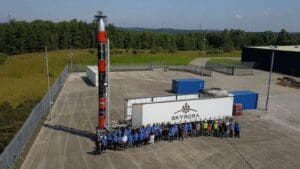In August 2025, Glasgow’s Skyrora became the first British manufacturer licensed to conduct vertical launches from the United Kingdom.This licence
will allow the company to launch its suborbital Skylark L rocket from the SaxaVord spaceport in the Shetland Islands, which previously received the necessary approvals from the UK Civil Aviation Authority (CAA).
This marks a major milestone for the UK, which has finally gained sovereign launch capabilities. At the same time, it is a story of new partnerships for the Ukrainian aerospace sector, made possible thanks to the investment of Max Polyakov, a Ukrainian entrepreneur and philanthropist. In 2017, Polyakov’s financing and the technologies he brought to the table helped transform Firefly Space Systems, a nearly bankrupt startup, into the successful Firefly Aerospace, which develops rockets for NASA to deliver payloads to the Moon. In summer 2025, Firefly Aerospace also held its first public stock offering (IPO) on the high-tech NASDAQ exchange.
Polyakov’s investment in Skyrora will enable the company to realise its ambitious plans and become the UK’s leading launch services provider.
SaxaVord in Scotland’s Shetland Islands, the spaceport from which Skyrora plans to launc
Max Polyakov: investor and innovator in the space sector
Born in the city of Zaporizhzhia in Ukraine, Max Polyakov has become known as an entrepreneur in space and IT technologies. He launched his first business, IT-Ukraine, in 2001, and three years later became co-founder of the IDE Group of companies. He is currently the founder of the Noosphere Ventures investment fund, the founder and co-owner of the space technology companies EOS Data Analytics and SETS, among others, and the co-founder of the non profit organisation Association Noosphere.
Since the start of Russia’s full-scale invasion of Ukraine, Polyakov has also been actively engaged in humanitarian initiatives and defence technology projects. A committed follower of the noosphere theory developed by the Ukrainian scholar Volodymyr Vernadsky, Polyakov believes that space and space technologies must serve the study of our planet and ensure the well-being of humanity and the Earth.
Firefly Aerospace: from near-bankruptcy to IPO
Polyakov founded Firefly Aerospace in 2017 after acquiring the assets, patents, and intellectual property of Firefly Space Systems. The following year, the newly formed company opened an R&D centre in the city of Dnipro. Five months later, it became one of the contractors selected by NASA to support the American lunar programme. Firefly’s Blue Ghost lander became the first spacecraft in history built by a private company to land successfully on the Moon.
The silhouette of Blue Ghost, the lunar lander developed by Firefly Aerospace for NASA’s Commercial Lunar Payload Services programm
2025 has been an eventful year for Firefly Aerospace. In addition to the successful Blue Ghost landing, the company received authorization to launch its Alpha rockets from the Esrange spaceport in Sweden and began working towards launch capability from a spaceport on the Japanese island of Hokkaido. In August, Firefly Aerospace made news by becoming a publicly traded company, debuting on the high-tech NASDAQ exchange. This is not typical in the aerospace sector, but the recent success of Karman, AIRO Group, and Voyager proved that the decision was viable: shortly after their IPOs, Karman’s shares rose 10%, and Voyager’s by 100%.
Firefly Aerospace shares, trading under the ticker FLY, were initially priced at $45. However, on the first day of trading, shares rose by 30% to $60.35. This raised Firefly $868 million, the largest space-technology IPO since the start of the year.
Going public was a key part of Firefly Aerospace’s long-term strategy. The company now has extensive experience in spacecraft development, launches, and landings. All of this is happening against the backdrop of a global launch-market dynamic where demand, from both state and private sectors, significantly exceeds supply. By expanding its manufacturing capacity, Firefly Aerospace could change that balance, accelerating the development and testing of new rockets.
Investing in Skyrora
Today, Max Polyakov is the majority shareholder of the Scottish space-rocket company, Skyrora. This company plays a key role in the development of the UK aerospace sector and aims to become the first private operator to launch a rocket into space from British soil.
Skyrora is also unique for its innovative technologies. It uses advanced 3D-printing methods to manufacture key rocket-engine components in the UK using its in-house Skyprint 2 printer, which significantly reduces costs and speeds up production. Additionally, Skyrora has developed Ecosene, a rocket fuel made from recycled plastic, making it a more environmentally friendly option for space launches.
This latest investment will help the company move forward with confidence and allow it to move on to even bolder projects. While commercial launches require substantial resources, the new injection of capital will help Skyrora scale up and achieve its ambitions. For years, the high cost of research, design, and testing for commercial launches held back the growth of the space economy. Today, financial flows into key areas of the space sector are accelerating, as investors put money into space technologies that transform entire industries, fully aware that such projects take time and may not deliver quick profits.
Max Polyakov’s approach to investment is to ensure a company’s stable operations and create conditions for teams to focus on achieving long-term commercial objectives. His goal is to bring companies to the point where they can attract large-scale investment with long-term return horizons. With Polyakov’s investment, Skyrora plans to continue scaling and providing commercial launch services, creating value above all for the UK.
With his successful track record of reviving Firefly Aerospace, Max Polyakov is well-positioned to help Skyrora become a leader in the European space sector. His investment in the Scottish space-rocket company will provide stability and long-term financing, which is crucial in a world where space technologies have become central to Earth’s well-being, addressing climate challenges and creating entirely new industries.
Thanks to this Ukrainian investor’s strategic approach and Skyrora’s innovative technologies, the future of the European space industry looks more promising and sustainable..

